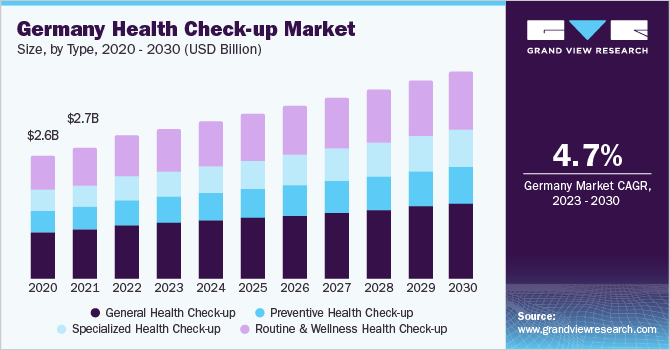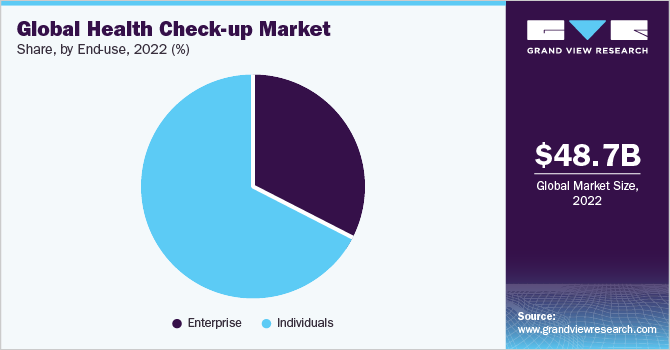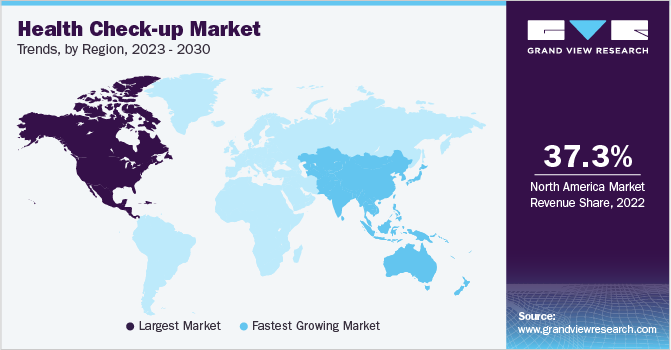
Health Check-up Market Size, Share & Trends Analysis Report By Type (General, Preventive), By Test Type, By Application (Cardiovascular, Cancer), By Service Provider, By End-use, By Region, And Segment Forecasts, 2023 - 2030
- Report ID: GVR-4-68040-081-2
- Number of Pages: 180
- Format: Electronic (PDF)
- Historical Range: 2018 - 2021
- Industry:Healthcare
Report Overview
The globalhealth check-up market sizewas valued atUSD 48.71 billion in 2022and is expected to grow at a compound annual growth rate (CAGR) of 5.3% from 2023 to 2030. The market growth is attributable to the increasing prevalence of chronic diseases, rising investments from government bodies to establish population medical screening initiatives, and the adoption of telemedicine & home-based services. For instance, in May 2023, the Indian Health Ministry launched a medical screening initiative for people with hypertension and diabetes. This initiative will provide standard care to around 75 million people suffering from non-communicable diseases by 2025.

Moreover, the introduction of telemedicine in general healthcare practices fueled the home-based testing market, while the healthcare ecosystem's digital connectivity framework powered the health check-up market during the COVID-19 pandemic. The increasing prevalence of life-threatening diseases is one of the key drivers for the industry. Additionally, non-communicable diseases such as diabetes, hypertension, cancer, and cardiovascular diseases are increasing, which often remain asymptomatic in the early stages. For instance, as per an AMGA article, more than 30% of the U.S. population suffers from prehypertension, increasing the chances of developing high blood pressure. Regular health check-up allows individuals to manage the condition effectively, as only 1 in 4 U.S. adults have their hypertension under control.
Additionally, government bodies are undertaking initiatives to screen the target population for different medical conditions. For instance, the U.S. Preventive Services Task Force (USPSTF) recommends yearly screening for adults aged 18 and older to manage blood pressure risks. Similarly, Middle Eastern economies have initiated medical screening programs to raise awareness of the increasing hypertension prevalence. For instance, in May 2023, the Ministry of Health and Prevention (MoHAP) UAE launched a national campaign for the early detection of hypertension. By 2030, UAE plans to reduce the prevalence of high blood pressure by 30%. Hence, increasing recommendations from government bodies will be key drivers for the global market.
The global market is experiencing innovation driven by the adoption of digital technology in the healthcare ecosystem. In the Europe region, countries are integrating medical services to improve healthcare facilities across multiple countries, which is driving the need for digital technologies. For instance, in June 2022, Nordic countries launched Nordic Interoperability Project (NIP) which aims to enable healthcare service providers in Sweden, Denmark, Norway, Finland, and Iceland to evaluate an integrated digital medical ecosystem focused on self-management and preventive care. Additionally, a proposal from the European Commission in May 2022 plans to create a European Health Data Space, which will harness the medical data of nearly 450 million people, thereby establishing cross-border digital healthcare connectivity. Increasing health monitoring through digital platforms will increase the adoption of general & preventive tests over the forecast period.
健康保险的可用性includes preventive care benefits encourages individuals to undergo routine check-ups, thereby driving market growth. For instance, as per the U.S. CDC, private health insurance in the U.S. covers around 66% of the insured population. In recent years, there has been a shift in insurance policies to prioritize preventive care. Most insurance providers now include preventive care services, such as health check-ups, vaccinations, and screenings, as part of their coverage at no additional cost. Furthermore, insurance companies require policyholders to undergo medical risk assessments as part of the underwriting process. These assessments typically involve health check-ups and help insurers assess the individual's wellness and determine appropriate coverage and premiums. Hence, underwriting processes and growing awareness of preventive care are anticipated to drive market growth.
Type Insights
The general health check-up segment held the largest share of 36.84% in 2022. General health check-up provides a comprehensive overview of the individual’s health, helping to identify risk factors and manage the health condition at early stages. Furthermore, healthcare professionals widely recommend general health check-ups as they contribute to reducing disease burdens in the future. Moreover, individuals are focusing on proactively managing their well-being, which will drive the market during the forecast period. Furthermore, insurance companies are providing preventive medical services with no-cost sharing benefits, which will help the market growth. For instance, in May 2023, KFF’s article estimated that 151.6 million U.S. citizens were covered by private insurance with a preventive no-cost sharing policy.
The specialized health check-up segment is expected to show the fastest growth rate during the forecast period. Specialized health check-ups focus on cardiovascular health, cancer screenings, metabolic disorders, or genetic predispositions. Targeted screenings and tests provide individuals with a comprehensive assessment and early detection of condition-specific risks. For instance, as per Cancer Research UK, an estimated 20.1 million people globally develop cancer each year with deaths exceeding 10 million annually. However, as per WHO report, 30%-50% of all cancer cases and deaths are preventable if targeted screening is diligently performed.
Test Type Insights
The blood glucose tests held the largest share of 21.91% in 2022, which can be attributed to the increasing cases of diabetes across the globe. Blood glucose tests, such as fasting blood sugar (FBS) and oral glucose tolerance tests (OGTT), are important in diagnosing and monitoring diabetes. Additionally, early detection of diabetes allows timely intervention and disease management, which can help prevent or delay complications associated with the disease. For instance, the National Center for Chronic Disease Prevention and Health Promotion estimated that nearly 96 million U.S. adults have prediabetes, while the average prevalence rate of prediabetes has increased by 3% from 2013 to 2020. Hence, the growing prevalence of prediabetes and diabetes is anticipated to provide lucrative growth opportunities to the global players in the global market.
The tumor biomarkers segment is expected to register the fastest growth rate during the forecast period. Tumor biomarker tests identify individuals with a higher risk of developing cancer-based on their biomarker profiles, family history, or other risk factors. In addition, tumor biomarkers provide valuable information on molecular characteristics, helping to create novel treatments. The inclusion of novel tumor biomarker test in preventive and specialized health check-up plans are expected to drive the segment growth during the forecast period.
Application Insights
The cardiovascular diseases segment held the largest market share of 28.59% in 2022, attributed to increasing disease prevalence, high mortality rates, and advancement in testing products. Cardiovascular diseases are the leading cause of death in the U.S., with conditions such as coronary heart disease (CHD), a major contributor to heart attacks. According to the American Heart Association, nearly 400,000 deaths in the U.S. were directly correlated with CHD. However, medical diagnostic companies are developing novel and highly sensitive CHD tests to reduce disease mortality with an early-stage diagnosis of the disease. For instance, in April 2023, Cardio Diagnostic Holdings Inc. launched a PrecionCHD blood test to detect coronary heart diseases. The platform is built by using the company’s AI and biomarkers such as epigenetic and genetic, which helps in improving the clinical specificity of the CHD test by 75%.
癌症段有望增长快est rate during the forecast period. The growth is attributed to the increasing prevalence of cancer across the economies, with high mortality rates in significant countries. Additionally, early detection of cancer can result in significant healthcare savings. For instance, as per an article published on MJH Life Sciences in November 2020, early diagnosis and screening of cancer can save around USD 26 billion annually. Additionally, cancer-related deaths can be reduced by 24% if cancer diagnosis is done from stage 1 to stage 3. Thereby, healthcare professionals are guiding at-risk people to undergo medical check-ups throughout the year, which is anticipated to contribute to the segment's growth during the forecast period.
Service Provider Insights
Hospital-based laboratories dominated the market with a share of 58.10% in 2022. Hospital-based laboratories are equipped with advanced medical equipment and infrastructure for conducting a wide range of diagnostic tests and screenings, thereby providing demand for the segment. Additionally, they have access to state-of-the-art technologies and facilities, which helps drive the revenue for health check-ups. For instance, in March 2023, White Plains Hospital launched a new in-house laboratory powered by innovative technologies, thereby, allowing to facilitate faster diagnosis and treatment for a larger patient pool. In addition, hospital-based laboratories are integrated with hospital services which enables an effective follow-up on health check-ups, curating a strong demand for hospital-based labs.
The standalone laboratories segment is expected to show the fastest growth rate during the forecast period. The high growth rate can be attributed to the ability of standalone labs to offer more competitive pricing structures than hospital-based laboratories. The low-cost structure is due to lower overhead and administrative costs than hospital-based laboratories. Additionally, established healthcare providers are expanding into standalone laboratories to provide service specificity and patient loyalty. For instance, in December 2021, MD Medical Group launched its first standalone medical lab in Moscow to facilitate specific services of “mother and child” diagnostics in the region.
End-use Insights
The individuals segment held the largest market share of 68.50% in 2022 attributed to the increasing awareness of general & preventive health benefits amongst the general population. Health check-ups are also recommended by healthcare professionals to understand disease prognosis and treatment methodologies. Individual end-users often pay the fee out of pocket or through private insurance. The segment’s growth is attributed to the increasing health consciousness among individuals and the desire for early detection and intervention to maintain well-being.

The enterprise segment of the market is expected to grow at the fastest rate during the forecast period. Enterprises such as multinational corporations, educational institutions, and government bodies offer health check-ups as an employee wellness benefit to assess the medical status of their employees, identify potential medical risks, and offer appropriate interventions. Moreover, individuals often face difficulty undergoing health check-ups owing to time constraints; hence, enterprise-based users provide strong health feasibility to employees. For instance, according to the American Academy of Family Physicians article published in April 2023, nearly half of all American women skipped a preventive health check-up service in the last year due to high out-of-pocket costs and problems in scheduling appointments.
Regional Insights
North America dominated the market with a share of 37.30% in 2022, it is due to the increasing healthcare coverage across the region. For instance, within the U.S., public and private insurance offers distinct advantages while covering a specific population base, and providing health check-ups across the country. For instance, as per Census Bureau’s report on insurance coverage in the U.S., nearly 35.7% of people held public health insurance coverage in 2021. In addition, the uninsured healthcare rate of U.S. children fell to 5.0% in 2021. Thereby, universal coverage across ages provides growth impetus to the health check-up industry in the region.

The Asia-Pacific region is expected to grow at the fastest rate during the forecast period. The market growth is due to the increasing government initiatives to improve healthcare services owing to an increased incidence of communicable and non-communicable diseases. For instance, in March 2023, the Indian Council of Medical Research (ICMR) informed the Indian government that cancer cases in the country are estimated to rise from 1.46 million in 2022 to 1.57 million in 2025. Moreover, the country has announced a population-based screening initiative for non-communicable diseases such as hypertension, common cancer, and diabetes. Due to the growing medical screening initiatives by governments across the economies, the region is anticipated to provide lucrative growth opportunities to the health check-up industry players.
Key Companies & Market Share Insights
The key players operating in the health check-up industry are enhancing healthcare services and increasing strategic initiatives such as collaboration between government and private companies to enhance the efficiency and effectiveness of medical screening services. Moreover, the increasing introduction of direct-to-customer tests is further anticipated to fuel the market growth over the forecast period. For instance, in February 2023, Hurdel launched a Vitamin D test in the U.S., which will be sold on the company’s online store. Furthermore, the preventive test will allow the physicians to discuss concerns over chronic conditions and wellness. Some prominent players in global health check-up market include:
Quest Diagnostics Incorporated
Laboratory Corporation of America Holdings
SYNLAB International GmbH
OPKO Health, Inc. (BioReference Health, LLC.)
Eurofins Scientific
UNILABS
Sonic Healthcare Limited
ARUP Laboratories
Q2 Solutions
LalPathLabs.com
Health Check-up Market Report Scope
Report Attribute |
Details |
Market size value in 2023 |
USD 51.36 billion |
Revenue forecast in 2030 |
USD 73.67 billion |
Growth rate |
CAGR of 5.3% from 2023 to 2030 |
Base year for estimation |
2022 |
Historical data |
2018 - 2021 |
Forecast period |
2023 - 2030 |
Quantitative units |
Revenue in USD million and CAGR from 2023 to 2030 |
Report coverage |
Revenue forecast, company ranking, competitive landscape, growth factors, trends |
Segments covered |
Type, test type, application, service provider, end-use, region |
Region scope |
北美;欧洲;亚太地区;拉丁美洲; MEA |
Country scope |
美国; Canada; Germany; UK; France; Italy; Spain; Denmark; Sweden; Norway; China; Japan; India; Australia; South Korea; Thailand; Brazil; Mexico; Argentina; South Africa; Saudi Arabia; UAE; Kuwait |
Key companies profiled |
Quest Diagnostics Incorporated; Laboratory Corporation of America Holdings; SYNLAB International GmbH; OPKO Health, Inc. (BioReference Health; LLC.); Eurofins Scientific; UNILABS; Sonic Healthcare Limited; ARUP Laboratories; Q2 Solutions; Laboratory Corporation of America Holdings; LalPathLabs.com |
Customization scope |
Free report customization (equivalent up to 8 analysts’ working days) with purchase. Addition or alteration to country, regional & segment scope. |
Pricing and purchase options |
Avail customized purchase options to meet your exact research needs.Explore purchase options |
Global Health Check-up Market Report Segmentation
This report forecasts revenue growth at global, regional, & country levels and provides an analysis of the latest industry trends in each of the sub-segments from 2018 to 2030. For this study, Grand View Research has segmented the global health check-up market report based on type, test type, application, service provider, end-use, and region:
Type Outlook (Revenue, USD Million, 2018 - 2030)
General Health Check-up
Preventive Health Check-up
Specialized Health Check-up
Routine and Wellness Health Check-up
Test Type Outlook (Revenue, USD Million, 2018 - 2030)
Blood Glucose Test
Kidney Function Test
Bone Profile Test
Electrolyte Test
Liver Function Test
Lipid Profile Test
Special Biochemistry
Cardiac Biomarkers
Hormones & Vitamins
Tumor Markers
Others
Application Outlook (Revenue, USD Million, 2018 - 2030)
Cardiovascular Diseases
Metabolic Disorders
Cancer
Inflammatory Conditions
Musculoskeletal Disorders
Neurological Conditions
Others
Service Provider Outlook (Revenue, USD Million, 2018 - 2030)
Hospital-Based Laboratories
Central Laboratories
Standalone Laboratories
End-use Outlook (Revenue, USD Million, 2018 - 2030)
Enterprise
Individuals
Regional Outlook (Revenue, USD Million, 2018 - 2030)
North America
美国
Canada
Europe
UK
Germany
France
Italy
Spain
Denmark
瑞典
Norway
Asia Pacific
Japan
China
India
Australia
South Korea
Thailand
拉丁美洲
Brazil
Mexico
Argentina
Middle East and Africa
South Africa
Saudi Arabia
UAE
Kuwait
Frequently Asked Questions About This Report
b.全球全球卫生检查rket size was estimated at USD 48.71 billion in 2022 and is expected to reach USD 51.36 billion in 2023.
b.全球全球卫生检查rket is expected to grow at a compound annual growth rate of 5.3% from 2023 to 2030 to reach USD 73.67 billion by 2030.
b.Hospital-based laboratories dominated the global health check-up market with a share of 58.10% in 2022. This is attributable to rising healthcare awareness coupled with cloud-based technologies acceptance and constant research and development initiatives.
b.Some key players operating in the global health check-up market include Quest Diagnostics Incorporated, Laboratory Corporation of America Holdings, SYNLAB International GmbH, OPKO Health, Inc. (BioReference Health, LLC.), Eurofins Scientific, UNILABS, Sonic Healthcare Limited, ARUP Laboratories, Q2 Solutions, Laboratory Corporation of America Holdings, LalPathLabs.com
b.Key factors that are driving the health check-up market growth include the increasing prevalence of chronic diseases, rising investments from government bodies to establish population medical screening initiatives, and adoption of telemedicine & home-based services





